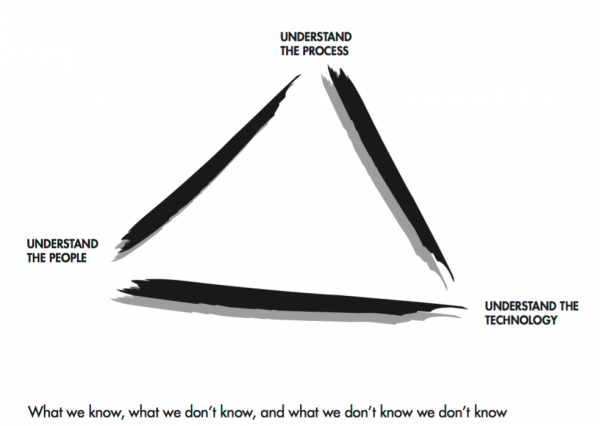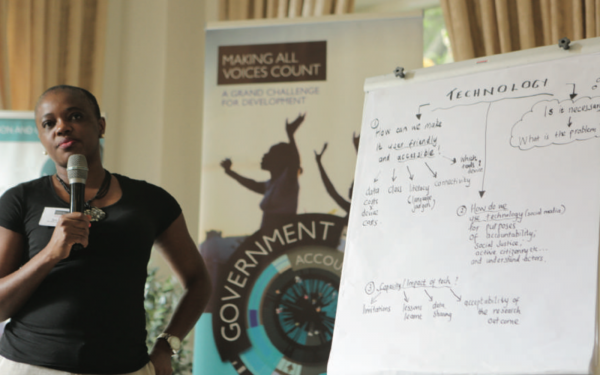The Making All Voices Count South Africa Community of Practice (CoP) is a peer learning group whose members -regional grantees and other interested stakeholders- share a vision for transparent governance systems that respond readily and appropriately to the needs of citizens.
Since its inception in 2014 the group has regularly held face-to-face meetings where members learn together about different aspects of their collective work. Now, at the end of the Making All Voices Count programme in November 2017, the group recently held a final event to reflect on the past four years and draw out insights on the impact of the CoP on members’ efforts to apply technology for better governance, accountability and citizen voice.
What change happened?
The South Africa Community of Practice members felt that the group provided valuable support throughout the Making All Voices Count programme. Broadly it was seen to play a vital role in operational and contextual learning. Flexibility and responsiveness of the CoP structure was particularly valued – the group found that whatever the programme design or implementation challenge, that they were able to find advice and solutions through the members’ collective wealth of skills and experience.

Five essential roles of the CoP
The group defined five valuable roles that the CoP had played over the four years. These roles were not necessarily regarded as distinct from the others, but rather indicate slightly differing perspectives held by participants.
- Feedback and critique: Participants identified feedback on their work as a vital role of the group. For example, meetings in September and November 2014 included opportunities for teams to present aspects of their plans and approaches for feedback from peers. Following this the September 2015 meeting focused on giving feedback to grantees and applicants on their theories of change. Some of the grantees were not technical experts in the fields of technology or governance and accountability, so they found accessing experienced peers through the CoP really helpful: this was especially important at the very early stages of project design where project teams could learn through their peers’ experience and rework their designs to avoid common mistakes.
- Support: A number of participants saw the CoP as a source of direct support for their work and a place to get help and inspiration. A session at the September 2017 meeting focused on mutual help proved highly productive with many animated small peer-help sessions taking place. This support was highly valued as many grantees felt they were on ‘new terrain’ with their ambitious and innovative projects.
More generally, participants thought that the CoP had also contributed to forming what was termed a ‘community of purpose’ – a supportive community uniting around shared values and goals.

Sue Tafeni from the Southern African HIV Clinicians Society during a Community of Practice workshop.
It was suggested that this can potentially be seen as the beginning of a horizontal accountability structure within this emerging field where peers are both supportive of and accountable to each other.
- Learning: Generally the CoP provided learning through enabling members to see problems and issues from different perspectives. Meetings were seen as really useful spaces to question and test assumptions, and also to become aware of previously unknown gaps in their own knowledge. For example, one member gained knowledge on mobile connectivity in South Africa helping them to understand the limits of mobile communications. Others mentioned accessing useful knowledge through MAVC research, for example, at the ‘Learning CoP’ in November 2016. Others highlighted that they gained insights from learning about projects that related directly to their own work: Pramod Mohonal of Yowzit (a tech company) reported that his participation in the SA CoP had led him to revise his tech-led approach through better understanding how Black Sash and other Civil Society Organisations approached citizen engagement and community monitoring of government services.
- Network building: The CoP provided the opportunity to make visible and learn about the network of organisations, institutions and individuals working in the same field. In later meetings grantees were also introduced to government actors (for example, the March 2015 meeting at the Department of Performance Monitoring and Evaluation and the May 2016 meeting on the Open Government Partnership).
- Collaboration brokering: A number of participants highlighted concrete partnerships and collaborations that had grown out of contacts made at the CoP. Luke Jordan of Grassroots mentioned meeting a group of housing activists at the local government CoP in 2016, which led to them using the Grassroot platform. The Freestate housing group linked up with amandla.mobi through the CoP and ran campaigns using their platform; they also connected with Black Sash which helped them in their work with advice centres. The Sustainable Livelihoods Foundation and University of Western Cape collaborated on a project in Delft in the Western Cape through the SA CoP. In addition at the September 2017 meeting, two organisations reported that they would be establishing collaborations with the Stop Stock out Campaign.
Future Actions
The South Africa CoP has established many new relationships, partnerships and momentum in the field of tech supported transparent governance systems, which look set to continue and grow beyond the MAVC project greatly strengthening the likelihood of improved and continuing learning in this field in South Africa.
This story of change has been adapted from the report, ‘MAVC South Africa Community of Practice Report’, November 2017, written by Indra De Lanerolle.
Related content
-
NEWS | October 20, 2017
TIMBY: Evidence-based reporting of environmental crimes in Liberia -
NEWS | October 23, 2017
Oil Journey: Following the money from oil revenue to improve… -
PROJECT | May 2, 2017
MOPA - Using data to improve waste management in Mozambique -
NEWS | November 16, 2017
Trac FM: Increasing effectiveness and government response to CSO campaigns… -
NEWS | November 15, 2017
LENGGO: Public budget tracking holds Kenyan county governments to account -
NEWS | April 6, 2017
Balangay: A mobile app for disseminating disaster information in Philippines -
NEWS | October 18, 2017
Game My Village: Improving and inspiring village participatory planning in…